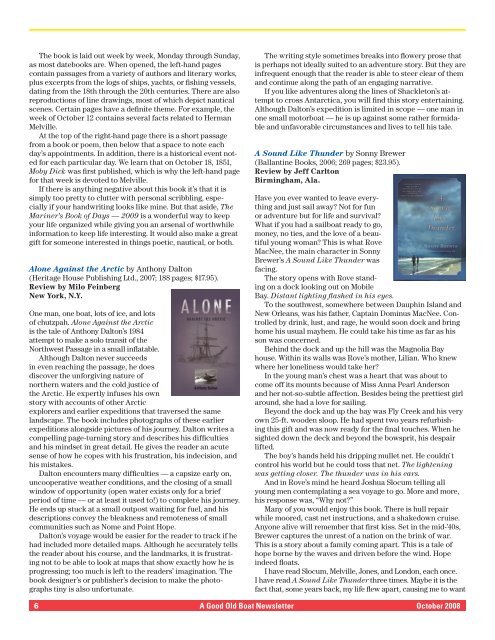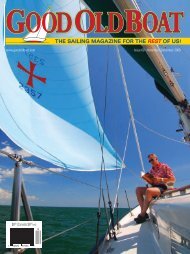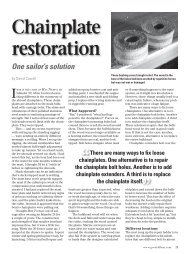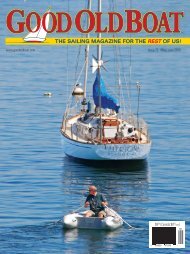PDF version - Good Old Boat Magazine
PDF version - Good Old Boat Magazine
PDF version - Good Old Boat Magazine
You also want an ePaper? Increase the reach of your titles
YUMPU automatically turns print PDFs into web optimized ePapers that Google loves.
The book is laid out week by week, Monday through Sunday,<br />
as most datebooks are. When opened, the left-hand pages<br />
contain passages from a variety of authors and literary works,<br />
plus excerpts from the logs of ships, yachts, or fishing vessels,<br />
dating from the 18th through the 20th centuries. There are also<br />
reproductions of line drawings, most of which depict nautical<br />
scenes. Certain pages have a definite theme. For example, the<br />
week of October 12 contains several facts related to Herman<br />
Melville.<br />
At the top of the right-hand page there is a short passage<br />
from a book or poem, then below that a space to note each<br />
day’s appointments. In addition, there is a historical event noted<br />
for each particular day. We learn that on October 18, 1851,<br />
Moby Dick was first published, which is why the left-hand page<br />
for that week is devoted to Melville.<br />
If there is anything negative about this book it’s that it is<br />
simply too pretty to clutter with personal scribbling, especially<br />
if your handwriting looks like mine. But that aside, The<br />
Mariner’s Book of Days — 2009 is a wonderful way to keep<br />
your life organized while giving you an arsenal of worthwhile<br />
information to keep life interesting. It would also make a great<br />
gift for someone interested in things poetic, nautical, or both.<br />
Alone Against the Arctic by Anthony Dalton<br />
(Heritage House Publishing Ltd., 2007; 188 pages; $17.95).<br />
Review by Milo Feinberg<br />
New York, N.Y.<br />
One man, one boat, lots of ice, and lots<br />
of chutzpah. Alone Against the Arctic<br />
is the tale of Anthony Dalton’s 1984<br />
attempt to make a solo transit of the<br />
Northwest Passage in a small inflatable.<br />
Although Dalton never succeeds<br />
in even reaching the passage, he does<br />
discover the unforgiving nature of<br />
northern waters and the cold justice of<br />
the Arctic. He expertly infuses his own<br />
story with accounts of other Arctic<br />
explorers and earlier expeditions that traversed the same<br />
landscape. The book includes photographs of these earlier<br />
expeditions alongside pictures of his journey. Dalton writes a<br />
compelling page-turning story and describes his difficulties<br />
and his mindset in great detail. He gives the reader an acute<br />
sense of how he copes with his frustration, his indecision, and<br />
his mistakes.<br />
Dalton encounters many difficulties — a capsize early on,<br />
uncooperative weather conditions, and the closing of a small<br />
window of opportunity (open water exists only for a brief<br />
period of time — or at least it used to!) to complete his journey.<br />
He ends up stuck at a small outpost waiting for fuel, and his<br />
descriptions convey the bleakness and remoteness of small<br />
communities such as Nome and Point Hope.<br />
Dalton’s voyage would be easier for the reader to track if he<br />
had included more detailed maps. Although he accurately tells<br />
the reader about his course, and the landmarks, it is frustrating<br />
not to be able to look at maps that show exactly how he is<br />
progressing; too much is left to the readers’ imagination. The<br />
book designer’s or publisher’s decision to make the photographs<br />
tiny is also unfortunate.<br />
The writing style sometimes breaks into flowery prose that<br />
is perhaps not ideally suited to an adventure story. But they are<br />
infrequent enough that the reader is able to steer clear of them<br />
and continue along the path of an engaging narrative.<br />
If you like adventures along the lines of Shackleton’s attempt<br />
to cross Antarctica, you will find this story entertaining.<br />
Although Dalton’s expedition is limited in scope — one man in<br />
one small motorboat — he is up against some rather formidable<br />
and unfavorable circumstances and lives to tell his tale.<br />
A Sound Like Thunder by Sonny Brewer<br />
(Ballantine Books, 2006; 269 pages; $23.95).<br />
Review by Jeff Carlton<br />
Birmingham, Ala.<br />
Have you ever wanted to leave everything<br />
and just sail away? Not for fun<br />
or adventure but for life and survival?<br />
What if you had a sailboat ready to go,<br />
money, no ties, and the love of a beautiful<br />
young woman? This is what Rove<br />
MacNee, the main character in Sonny<br />
Brewer’s A Sound Like Thunder was<br />
facing.<br />
The story opens with Rove standing<br />
on a dock looking out on Mobile<br />
Bay. Distant lighting flashed in his eyes.<br />
To the southwest, somewhere between Dauphin Island and<br />
New Orleans, was his father, Captain Dominus MacNee. Controlled<br />
by drink, lust, and rage, he would soon dock and bring<br />
home his usual mayhem. He could take his time as far as his<br />
son was concerned.<br />
Behind the dock and up the hill was the Magnolia Bay<br />
house. Within its walls was Rove’s mother, Lilian. Who knew<br />
where her loneliness would take her?<br />
In the young man’s chest was a heart that was about to<br />
come off its mounts because of Miss Anna Pearl Anderson<br />
and her not-so-subtle affection. Besides being the prettiest girl<br />
around, she had a love for sailing.<br />
Beyond the dock and up the bay was Fly Creek and his very<br />
own 25-ft. wooden sloop. He had spent two years refurbishing<br />
this gift and was now ready for the final touches. When he<br />
sighted down the deck and beyond the bowsprit, his despair<br />
lifted.<br />
The boy’s hands held his dripping mullet net. He couldn`t<br />
control his world but he could toss that net. The lightening<br />
was getting closer. The thunder was in his ears.<br />
And in Rove’s mind he heard Joshua Slocum telling all<br />
young men contemplating a sea voyage to go. More and more,<br />
his response was, “Why not?”<br />
Many of you would enjoy this book. There is hull repair<br />
while moored, cast net instructions, and a shakedown cruise.<br />
Anyone alive will remember that first kiss. Set in the mid-’40s,<br />
Brewer captures the unrest of a nation on the brink of war.<br />
This is a story about a family coming apart. This is a tale of<br />
hope borne by the waves and driven before the wind. Hope<br />
indeed floats.<br />
I have read Slocum, Melville, Jones, and London, each once.<br />
I have read A Sound Like Thunder three times. Maybe it is the<br />
fact that, some years back, my life flew apart, causing me to want<br />
6 A <strong>Good</strong> <strong>Old</strong> <strong>Boat</strong> Newsletter October 2008
















